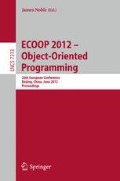Abstract
Atomic sections can be implemented using lock inference. For lock inference to be practically useful, it is crucial that large libraries be analysed. However, libraries are challenging for static analysis, due to their cyclomatic complexity.
Existing approaches either ignore libraries, require library implementers to annotate which locks to take or only consider accesses performed upto one level deep in library call chains. Thus, some library accesses may go unprotected, leading to atomicity violations that atomic sections are supposed to eliminate.
We present a lock inference approach for Java that analyses library methods in full. We achieve this by (i) formulating lock inference as an Interprocedural Distributive Environment dataflow problem, (ii) using a graph representation for summary information and (iii) applying a number of optimisations to our implementation to reduce space-time requirements and locks inferred. We demonstrate the scalability of our approach by analysing the entire GNU Classpath library comprising 122KLOC.
Access this chapter
Tax calculation will be finalised at checkout
Purchases are for personal use only
Preview
Unable to display preview. Download preview PDF.
References
Lomet, D.B.: Process structuring, synchronization, and recovery using atomic actions. SIGPLAN Not. (1977)
Grossman, D.: The transactional memory/garbage collection analogy. In: Proceedings of the 22nd Annual ACM SIGPLAN Conference on Object-Oriented Programming Systems and Applications (2007)
Cantrill, B., Bonwick, J.: Real-world concurrency. ACM Queue (2008)
Sutter, H.: The Free Lunch Is Over: A Fundamental Turn Toward Concurrency in Software. Dr. Dobb’s Journal (2005)
Larus, J., Rajwar, R.: Transactional Memory (Synthesis Lectures on Computer Architecture). Morgan & Claypool Publishers (2007)
Rountev, A., Sharp, M., Xu, G.: IDE Dataflow Analysis in the Presence of Large Object-Oriented Libraries. In: Hendren, L. (ed.) CC 2008. LNCS, vol. 4959, pp. 53–68. Springer, Heidelberg (2008)
McCabe, T.: A complexity measure. IEEE Trans. on Soft. Eng. (1976)
Hicks, M., Foster, J.S., Pratikakis, P.: Lock inference for atomic sections. In: Proceedings of the First ACM SIGPLAN Workshop on Languages Compilers, and Hardware Support for Transactional Computing (TRANSACT) (2006)
Cherem, S., Chilimbi, T.M., Gulwani, S.: Inferring locks for atomic sections. In: PLDI (2008)
Emmi, M., Fischer, J.S., Jhala, R., Majumdar, R.: Lock allocation. In: POPL (2007)
Zhang, Y., Sreedhar, V.C., Zhu, W., Sarkar, V., Gao, G.R.: Minimum Lock Assignment: A Method for Exploiting Concurrency among Critical Sections. In: Amaral, J.N. (ed.) LCPC 2008. LNCS, vol. 5335, pp. 141–155. Springer, Heidelberg (2008)
McCloskey, B., Zhou, F., Gay, D., Brewer, E.: Autolocker: synchronization inference for atomic sections. ACM SIGPLAN Notices (2006)
Halpert, R.L., Pickett, C.J.F., Verbrugge, C.: Component-based lock allocation. In: PACT (2007)
Cunningham, D., Gudka, K., Eisenbach, S.: Keep Off the Grass: Locking the Right Path for Atomicity. In: Hendren, L. (ed.) CC 2008. LNCS, vol. 4959, pp. 276–290. Springer, Heidelberg (2008)
Sagiv, Reps, Horwitz: Precise Interprocedural Dataflow Analysis with Applications to Constant Propagation. TCS: Theoretical Computer Science 167 (1996)
Vallée-Rai, R., Co, P., Gagnon, E., Hendren, L.J., Lam, P., Sundaresan, V.: Soot - a java bytecode optimization framework. In: CASCON (1999)
Gray, J.N., Lorie, R.A., Putzolu, G.R.: Granularity of locks in a shared data base. In: VLDB 1975: Proceedings of the 1st International Conference on Very Large Data Bases (1975)
Chan, B., Abdelrahman, T.S.: Run-time support for the automatic parallelization of java programs. J. Supercomput. (2004)
Bodden, E., Sewe, A., Sinschek, J., Oueslati, H., Mezini, M.: Taming reflection: Aiding static analysis in the presence of reflection and custom class loaders. In: ICSE 2011: International Conference on Software Engineering (2011)
Lhotak, O.: Program Analysis Using Binary Decision Diagrams. PhD thesis
Gudka, K., Eisenbach, S.: Fast Multi-Level Locks for Java: A Preliminary Performance Evaluation. In: EC2 2010: Workshop on Exploiting Concurrency Efficiently and Correctly (2010)
Lea, D.: The java.util.concurrent synchronizer framework. Sci. Comput. Program (2005)
Goetz, B., Peierls, T., Bloch, J., Bowbeer, J., Holmes, D., Lea, D.: Java Concurrency in Practice. Addison-Wesley (2006)
Magee, J., Kramer, J.: Concurrency: state models & Java programs. Wiley, New York (2006)
Harris, T., Marlow, S., Peyton-Jones, S., Herlihy, M.: Composable memory transactions. In: Proceedings of the Tenth ACM SIGPLAN Symposium on Principles and Practice of Parallel Programming (2005)
Blackburn, S.M., et al.: The DaCapo benchmarks: Java benchmarking development and analysis. In: OOPSLA 2006: Proceedings of the 21st Annual ACM SIGPLAN Conference on Object-Oriented Programing, Systems, Languages, and Applications (2006)
Halpert, R.L.: Static lock allocation. Master’s thesis. McGill University (2008)
Naumovich, G., Avrunin, G.S.: A conservative data flow algorithm for detecting all pairs of statement that happen in parallel. In: SIGSOFT FSE (1998)
Sharir, M., Pnueli, A.: Two approaches to interprocedural data flow analysis. In: Program Flow Analysis: Theory and Applications (1981)
Khedker, U.P., Karkare, B.: Efficiency, Precision, Simplicity, and Generality in Interprocedural Data Flow Analysis: Resurrecting the Classical Call Strings Method. In: Hendren, L. (ed.) CC 2008. LNCS, vol. 4959, pp. 213–228. Springer, Heidelberg (2008)
Gulwani, S., Tiwari, A.: Computing Procedure Summaries for Interprocedural Analysis. In: De Nicola, R. (ed.) ESOP 2007. LNCS, vol. 4421, pp. 253–267. Springer, Heidelberg (2007)
Rountev, A.: Component-Level Dataflow Analysis. In: Heineman, G.T., Crnković, I., Schmidt, H.W., Stafford, J.A., Ren, X.-M., Wallnau, K. (eds.) CBSE 2005. LNCS, vol. 3489, pp. 82–89. Springer, Heidelberg (2005)
Whaley, J., Lam, M.S.: An Efficient Inclusion-Based Points-To Analysis for Strictly-Typed Languages. In: Hermenegildo, M.V., Puebla, G. (eds.) SAS 2002. LNCS, vol. 2477, pp. 180–195. Springer, Heidelberg (2002)
Choi, J., Gupta, M., Serrano, M., Sreedhar, V., Midkiff, S.: Escape analysis for Java. In: Proceedings of the 14th ACM SIGPLAN Conference on Object-Oriented Programming, Systems, Languages, and Applications (1999)
Author information
Authors and Affiliations
Editor information
Editors and Affiliations
Rights and permissions
Copyright information
© 2012 Springer-Verlag Berlin Heidelberg
About this paper
Cite this paper
Gudka, K., Harris, T., Eisenbach, S. (2012). Lock Inference in the Presence of Large Libraries. In: Noble, J. (eds) ECOOP 2012 – Object-Oriented Programming. ECOOP 2012. Lecture Notes in Computer Science, vol 7313. Springer, Berlin, Heidelberg. https://doi.org/10.1007/978-3-642-31057-7_15
Download citation
DOI: https://doi.org/10.1007/978-3-642-31057-7_15
Publisher Name: Springer, Berlin, Heidelberg
Print ISBN: 978-3-642-31056-0
Online ISBN: 978-3-642-31057-7
eBook Packages: Computer ScienceComputer Science (R0)

